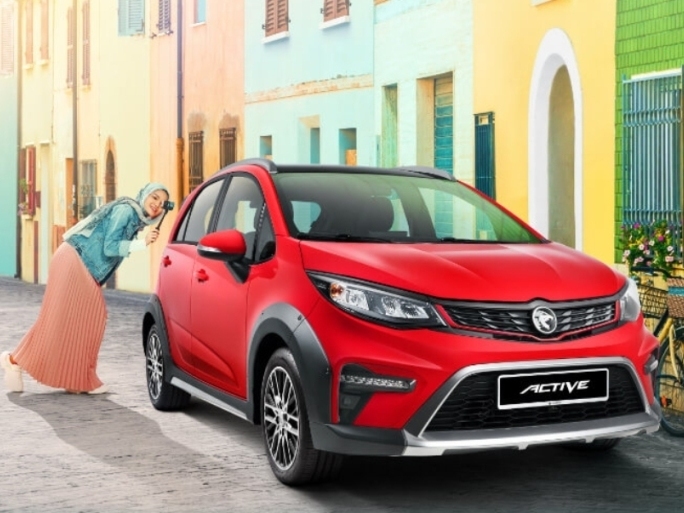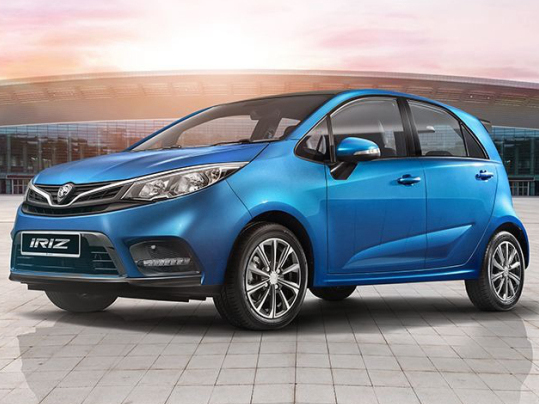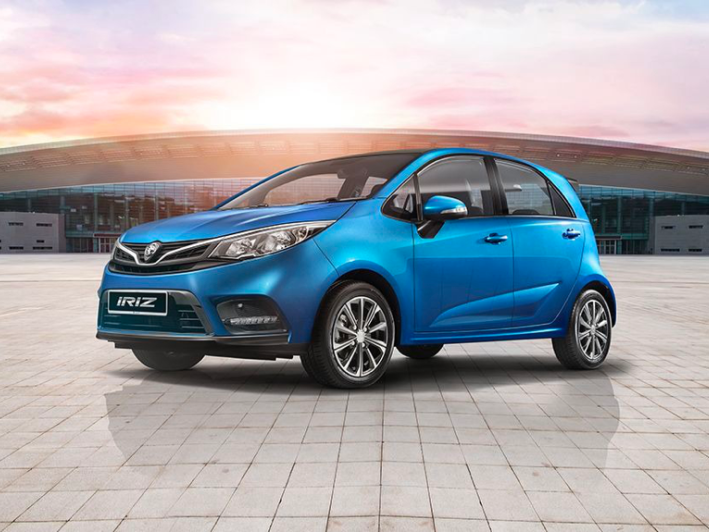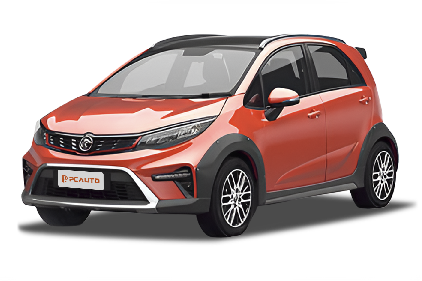Q
What segment does the Iriz belong to?
The Iriz belongs to the B-Segment. This segment of vehicles typically have compact dimensions, measuring approximately over 3,900 mm in length and over 1,700 mm in width, suitable for urban commuting and crowded city driving.
Take the Iriz's 5-seat configuration and reasonably sized trunk capacity for exmple, B-Segment models emphasize practical space design to meet family transportation needs. In powertrain, the Iriz offers various engine displacements to accommodate different consumer preferences for performance and fuel efficiency.
Furthermore, vehicles in this segment are gradually equipped with comprehensive features - ranging from fundamental safety systems to comfort and convenience amenities - delivering a well-rounded driving experience for consumers.
Special Disclaimer: This content is published by users and does not represent the views or position of PCauto.
Related Q&A
Q
What is the fuel consumption of 2021 Proton Iriz?
The fuel efficiency of the 2021 Proton Iriz varies by engine configuration. Models equipped with the 1.3-liter VVT engine deliver an average combined fuel consumption of around 5.6 liters per 100 kilometers, while the 1.6-liter VVT version comes in at approximately 5.8 liters per 100 kilometers. Actual fuel usage may fluctuate slightly depending on driving habits, road conditions, and vehicle maintenance status. This car features Proton's Efficient Dynamics technology, including lightweight body design and low-rolling-resistance tires, which help improve fuel economy. For Malaysian consumers, the Iriz's fuel efficiency ranks above average among its class of hatchbacks, making it suitable for city commuting. To further reduce fuel consumption, it's advisable to maintain a steady speed, avoid sudden acceleration and hard braking, and regularly replace the air filter and spark plugs. It's worth noting that fuel efficiency test data is typically based on ideal laboratory conditions, and real-world driving may vary due to factors like weather and traffic conditions. Therefore, owners can track their actual fuel consumption under personal driving conditions by recording fuel refills and mileage driven.
Q
What is the fuel consumption per 100km of Proton Iriz?
The official combined fuel consumption figures for different versions of the Proton Iriz show some variation. The 1.3-liter version has an official combined fuel consumption of 6.6 to 6.9 L/100km, while the 1.6-liter version ranges from 7.4 to 8.36 L/100km. However, the actual fuel consumption of a vehicle may fluctuate due to factors such as driving habits, road conditions, and vehicle load.
For instance, aggressive acceleration, hard braking, and frequent stop-and-go driving can lead to increased fuel consumption. Additionally, driving for extended periods in congested conditions, where the engine is idling or operating at low speeds, can also cause fuel efficiency to drop. Excessive vehicle load, such as carrying numerous items or a full passenger capacity, similarly results in greater fuel usage.
Understanding these influencing factors can help drivers maintain good driving habits and manage vehicle load effectively, thereby reducing actual fuel consumption.
Q
What are the fuel consumptions of Iriz and Persona?
The fuel consumptions of Proton Iriz and Persona primarily depend on engine configuration and driving conditions, though official test data provides general reference ranges.
The Iriz is equipped with 1.3L and 1.6L VVT naturally aspirated engines. The 1.3L manual variant achieves approximately 14 km/L (city) to 18 km/L (highway) under standard test conditions, with the automatic version being 1-2 km/L lower. The 1.6L version consumes about 10% more fuel.
The Persona is equipped with a 1.6L engine, delivering combined fuel economy of about 15-16 km/L for manual transmission and 14-15 km/L for CVT variants. Its heavier body results in slightly lower fuel efficiency compared to the Iriz.
In real-world driving, fuel consumption may worsen by 20% in heavy traffic conditions, while steady-speed cruising on highways like the North-South Expressway may approach official figures.
Owners are advised to maintain proper tire pressure (190-210 kPa), avoid aggressive acceleration, and utilize cruise control to optimize fuel economy. These models deliver average fuel efficiency for their class in Malaysia, with regular maintenance (including throttle body cleaning and spark plug replacement) being crucial for sustaining optimal performance.
Q
What is the fuel consumption of Iriz 2018?
The fuel consumption of the 2018 Proton Iriz varies depending on engine and transmission configurations. The 1.3L manual version has a combined fuel economy of approximately 5.5L/100km (about 18.2km/L), while the 1.3L CVT automatic version averages around 5.9L/100km (about 17km/L). As for the 1.6L engine variants, the manual transmission model consumes about 6.1L/100km (approximately 16.4km/L), with the CVT automatic version at roughly 6.5L/100km (about 15.4km/L).
Actual driving fuel efficiency is influenced by multiple factors, including traffic conditions (such as higher consumption in congested Kuala Lumpur urban areas), driving habits (aggressive acceleration or high-speed driving increases fuel usage), and vehicle maintenance condition (cleanliness of air filters and spark plugs, proper tire pressure).
To optimize fuel economy, we recommend maintaining smooth throttle control, utilizing Eco mode (if equipped), and performing regular maintenance. Proper driving techniques can help your Iriz achieve closer-to-official fuel consumption figures while also extending its engine lifespan.
Q
What's the color of Proton Iriz?
The Proton Iriz offers a variety of color options in Malaysia, including standard colors such as Snow White, Silver, Graphite Grey, Ruby Red, and Marine Blue. Some variants even have the combination of two colors, like Solid Black paired with Pearl White. All paints utilize high-quality coatings designed for Malaysia's hot and humid climate, ensuring long-term color retention without fading.
When selecting a color, buyers may consider not only personal preference but also factors like resale value and maintenance costs. Lighter colors such as white and silver are popular choices in Malaysia as they absorb less heat during summer months and show minor scratches less noticeably. Meanwhile, darker colors like black or red offer a more dynamic appearance but are more sensitive to sun exposure and dust.
Q
Is Iriz equipped with a turbocharged engine?
The Proton Iriz is not available with a turbocharged engine option, as the entire lineup is equipped with naturally aspirated engines with either 1.3L or 1.6L displacement. While the Iriz lacks turbocharging technology, its engines perform well in fuel efficiency and daily urban driving. The linear power output of these naturally aspirated engines is particularly suitable for Malaysia's frequent stop-and-go traffic conditions.
For consumers seeking more powerful performance, Proton offers other models like the X50 or X70, both equipped with 1.5L turbocharged engines that provide stronger acceleration. Proton has not announced any plans to introduce a turbocharged version of the Iriz, but any future developments would typically be released through official channels.
For budget-conscious owners prioritizing practicality, the naturally aspirated Iriz is an attractive choice, offering advantages in maintenance costs and fuel efficiency.
Q
What are the different variants of Iriz?
The Proton Iriz is available in multiple variants. In engine displacement, there are 1.3L and 1.6L options.
The 2023 Proton Iriz 1.3 Standard CVT is priced at RM 42,800 with an official combined fuel consumption of 6.9L/100km and a maximum engine output of 95PS.
The 2023 lineup also includes two 1.6L versions: the 1.6 Executive CVT and 1.6 Active CVT, priced at RM 50,300 and RM 57,300 respectively. Both are equipped with a 109PS engine with official combined fuel economy of 7.4L/100km.
These variants differ in configurations. For example, the 1.3 Standard CVT provides 4 airbags, while both 1.6L versions offer 6 airbags. Additional features are also different - the 1.6 Active CVT includes voice-controlled air conditioning, while some models are equipped with front parking sensors and reverse cameras. Buyers can choose according to their budget and requirements.
Q
What is the safety rating of Proton Iriz?
The Proton Iriz achieved an impressive 5-star safety rating in the 2014 ASEAN New Car Assessment Program (ASEAN NCAP) testing - a remarkable accomplishment for a B-segment hatchback. This rating shows the Iriz's high standards in body structure rigidity, crash protection, and active/passive safety features. The model is equipped with key safety technologies including dual airbags (upgraded to six airbags in higher trims), ABS anti-lock braking system, EBD electronic brake-force distribution, and ESC electronic stability control.
Notably, the Iriz scored 14.93 out of 16 points in adult occupant protection and 42.45 out of 49 points in child occupant protection - outstanding results in its vehicle class that make it particularly suitable for safety-conscious consumers in Malaysia. While the 2023 model hasn't undergone renewed testing, subsequent Proton models like the X50 and X70 have maintained these high safety standards, proving the brand's persistent commitment to safety performance.
For budget-minded consumers in Malaysia seeking premium safety features, the Iriz is a popular choice.
Q
What type of engine is the Proton Iriz equipped with?
The Proton Iriz mainly adopts naturally aspirated engines, available in 1.3L and 1.6L displacements.
The 1.3L engine has a displacement of 1,332 mL, delivering maximum power of 95 PS (70 kW) at 5,750 rpm and peak torque of 120 N·m at 4,000 rpm, with an inline 4-cylinder configuration.
The 1.6L engine features 1,597 mL displacement, producing 109 PS (80 kW) maximum power at 5,750 rpm and 150 N·m peak torque at 4,000 rpm, also in an inline 4-cylinder arrangement.
These two engine options cater to different driver needs - the smaller displacement suits economical daily driving, while the larger engine provides enhanced performance for power-oriented drivers.
Q
What is the fuel consumption of the Iriz 1.3 manual transmission?
The Iriz 1.3 manual transmission model, officially named the 2019 Proton Iriz 1.3 VVT Standard MT, has an official combined fuel consumption of 6.7L/100km. This B-segment vehicle measures 3,945mm in length, 1,722mm in width, and 1,554mm in height, with a wheelbase of 2,555mm and a curb weight of 1,132kg. It is equipped with a naturally aspirated 4-cylinder engine delivering maximum power of 95PS (70kW).
Its front suspension features MacPherson struts, complemented by ventilated disc brakes. It runs on 175/65 R14 tires all around. Safety features include ABS anti-lock braking and electronic stability control. The cabin offers mostly manual-adjustment seats and a single-zone manual air conditioning system. Understanding these specifications will help you better know this model's fuel efficiency and overall performance.
Popular Cars
Model Year
Car Compare
Car Photo
Latest Q&A
Q
Can I run my ceramic coated car through a car wash?
Vehicles with a coating can be washed normally, but special attention should be paid to the maintenance period after application and daily cleaning methods. Car washing should be avoided for 7 to 14 days after coating to ensure the silicon components fully cure and form a protective layer; if the environment is dry, a minimum waiting period of 48 hours is required. If the vehicle becomes excessively dirty during this time, it may be gently wiped with a slightly damp microfiber cloth—use of high-pressure washers or stiff brushes is strictly prohibited. For regular washing, use a pH-neutral car shampoo, as alkaline cleaners will degrade the coating. Hand washing is recommended to avoid scratches from automatic car wash rotating brushes. Maintain a distance of at least 30 cm between the spray nozzle and paint surface, keep water temperature below 35°C, and rinse from top to bottom to minimize water spotting. When parking, avoid areas prone to falling corrosive substances (such as under trees), and have the coating inspected quarterly. Professional maintenance can extend protection beyond 12 months. Note: postpone washing during rainy seasons or when temperatures exceed 30°C, as extreme conditions may compromise coating integrity.
Q
How much does a 7 year ceramic coating cost?
The price of 7-year ceramic coating typically ranges from 3000 to 8000 Malaysian Ringgit, with the exact cost depending on product quality, vehicle size, and application techniques. High-end ceramic coatings use silica or glass-based components, with a hardness of over 8H, effectively resisting acid rain, ultraviolet rays, and moderate scratches, and offering a protection period of 5 to 7 years. The application process includes paint polishing and operation in a dust-free workshop, making it suitable for luxury vehicles or car owners seeking long-term protection. Mid-range products cost approximately 1500 to 3000 Malaysian Ringgit with a protection period of 3 to 5 years, suitable for mid-to-high-end sedans. Price differences are mainly influenced by brand premiums (e.g., imported products), application complexity (SUVs cost 20%-30% more than sedans), and shop certifications. It is recommended to choose professionally certified shops and request product testing reports to avoid paint oxidation caused by inferior coatings. For daily maintenance, avoid using strong alkaline car wash detergents, and a coating maintenance treatment can be performed every six months to extend its effectiveness.
Q
Why do car manufacturers not do ceramic coating?
Automakers have not widely adopted ceramic coatings mainly due to considerations of cost control, production process compatibility, and market demand balance. Although ceramic coatings offer advantages such as high hardness, corrosion resistance, and self-cleaning properties, their application requires specialized construction environments (e.g., dust-free workshops) and complex pretreatment (e.g., paint surface degreasing and polishing), which conflicts with vehicle manufacturers' efficient assembly line operations. Taking the Tata Safari as an example, its ceramic coating service is priced at approximately 2,500 rupees and requires completion through independent after-sales channels, highlighting the economic challenges of direct OEM integration. From a technical perspective, while nano-ceramic coatings' MSDS certification and inorganic compound properties can enhance body protection, large-scale application may compromise compatibility with existing electrophoretic coating systems. At the market level, local brands like Proton and Perodua tend to prioritize meeting basic needs, leaving advanced protective functions to third-party modification markets—a division of labor that better aligns with current consumer expectations for cost-effectiveness. Notably, the 3-year efficacy of ceramic coatings in Malaysia's hot and rainy climate still requires long-term validation, which may be another factor contributing to automakers' cautious stance. As local assembly plants increasingly emphasize differentiated services, more brands may follow Tata's approach by offering value-added coating solutions through authorized dealerships in the future.
Q
Is there a downside to ceramic coating?
Although ceramic coating offers advantages such as high hardness, strong hydrophobicity, and long-lasting protection, it still has some limitations. First, the application must be carried out by professionals in a dust-free environment. If the environment is substandard or the technique is not standardized, impurities or bubbles may appear in the coating layer, affecting the performance and even damaging the car paint. Second, the coating cannot enhance the physical hardness of the original car paint, and its protection against scratches from hard objects or impacts is limited. Moreover, after local damage, the entire surface needs to be repaired, resulting in high maintenance costs. The cost of each re-coating ranges from approximately 500 to 2000 Malaysian Ringgit. In addition, although the glossiness of ceramic coating is superior to that of ordinary coatings, it is still slightly inferior to glazing products. Car owners seeking the ultimate mirror-like finish may need to consider this trade-off. It is worth noting that the coating's effectiveness will diminish over time, and re-application is typically required after 2 to 3 years, so the long-term cost of ownership should be factored in. It is recommended that car owners select the coating type based on the vehicle's operating environment (such as rainy or high-temperature regions) and budget, while prioritizing certified installation centers to ensure quality.
Q
Can you see out of ceramic tint at night?
High-quality ceramic films provide clear visibility at night, with light transmittance typically maintained between 5% and 75%. The mainstream light transmittance of front windshield films ensures it is ≥70%, fully complying with the regulatory requirements for safe driving. Compared with films containing metal components, ceramic films use non-metallic materials such as titanium nitride, resulting in significantly lower reflectivity, which avoids the problem of glare at night. At the same time, the uniform distribution of nano-ceramic particles ensures efficient light transmission, so the driver's observation of road conditions will not be affected by insufficient light. It is worth noting that some dark-colored side window or rear windshield films may have lower light transmittance, but regular brand products will clearly indicate the parameters. It is recommended to choose models with light transmittance ≥35% to ensure nighttime safety. In addition, the stability of ceramic films allows them to maintain their initial light transmission performance after long-term use, without the problem of decreased light transmittance caused by oxidation as seen in metal films. If you have higher requirements for night vision, you can prioritize ceramic film products with photochromic technology. Such films can automatically adjust the light transmittance according to ambient light, further enhancing clarity at night.
View MoreRelated News

Perodua Myvi's competitor Proton Iriz officially discontinued, ending its 11-year sales journey
JohnSep 11, 2025

Proton Iriz Interior Design Revealed: Economical and Well-Equipped
RobertJul 24, 2025

Proton Iriz Buying Guide: Captivating Consumers with Stylish Design and Abundant Features
LienApr 21, 2025

The Proton Iriz starts at RM 42,800, with two engines, both paired with a CVT gearbox.
LienJun 20, 2024

2026 Proton e.MAS 7 PHEV Officially Launched in Malaysia, Entering the Household C-segment PHEV Market at a Lower Price
RobertFeb 5, 2026
View More


















Pros
Cons